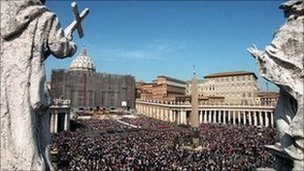By Mark Simpson
BBC
July 20, 2011
http://www.bbc.co.uk/news/uk-northern-ireland-14228354
 |
The blistering attack on the Vatican by Taoiseach Enda Kenny epitomises the dramatic transformation of Irish society in recent years.
The age of deference is long gone.
As well as being more secular, Ireland is also more liberal, more open and more pluralist.
What it really needs is more money. But that is another story.
The unprecedented attack on the Catholic Church by the government is not the only sign of changing Ireland.
The next chief justice, Susan Denham, is the first woman and the first Protestant to be appointed to the position.
The warm welcome given to the Queen on her recent four-day visit to Dublin demonstrated a sea-change in Ireland's attitude to its nearest neighbour.
It is possible that the next Irish President could be gay.
An Irish Times opinion poll found that independent senator David Norris is the most popular potential candidate ahead of October's election.
The survey suggested that the most important issue in the election is ensuring "someone who represents Ireland well" wins the contest.
Ireland's reputation abroad has taken a battering in recent years as a result of the country's financial crisis, and the humiliation of needing an international bail-out.
The collapse of the Celtic Tiger economy had a huge impact. Faith in banks - and in politicians - plummeted.
The recent history of Ireland has seen the state - and the church - fall off their pedestals.
The Catholic Church had further to fall, given its long-held lofty place in Irish society.
Historically, the Catholic Church has been revered in Ireland, not least by those in power. It was even given a special place in the original Irish constitution.
The deference was perhaps best encapsulated in a photograph the 1960s, of the then president Eamon de Valera on one knee, kissing the ring of Archbishop John Charles McQuaid.
Three decades later, the revelations began about clerical child-sex abuse in Ireland.
Successive Irish governments were critical of the Church's handling of the scandals, but a recent report in the diocese of Cloyne in Co Cork showed that allegations of abuse were being covered up as recently as three years ago.
For Taoiseach Enda Kenny, this was the final straw.
His subsequent criticism of the Catholic Church included language never heard before in the Irish Parliament.
He spoke about the "dysfunction, disconnection, elitism and narcissism that dominate the culture of the Vatican to this day".
He added: "This is not Rome. This is the Republic of Ireland 2011."
He emphasised the word 'republic'.
It is clear that the relationship between the church and the state in Ireland will never be the same again. Or to borrow from W B Yeats, it is changed, changed utterly.
In the past, it used to be said that the typical prosperous Irish family had "a bull in the field and a son in the church". Not any more. There is a shortage of priests.
There is no doubt that the Ireland of 2011 is in many ways unrecognisable to the Ireland of 50 years ago. Even to 30 years ago.
However, there are differing views on whether the changes have all been improvements.
That debate will continue for some time.
So will arguments about the Catholic Church's continued role in the Irish education system, changes to Irish abortion laws, reform of the banking system, future relations with Europe and whether or not to stick with the Euro.
It is just as well that the Irish are good at talking.
That is one thing that will never change.
Any original material on these pages is copyright © BishopAccountability.org 2004. Reproduce freely with attribution.